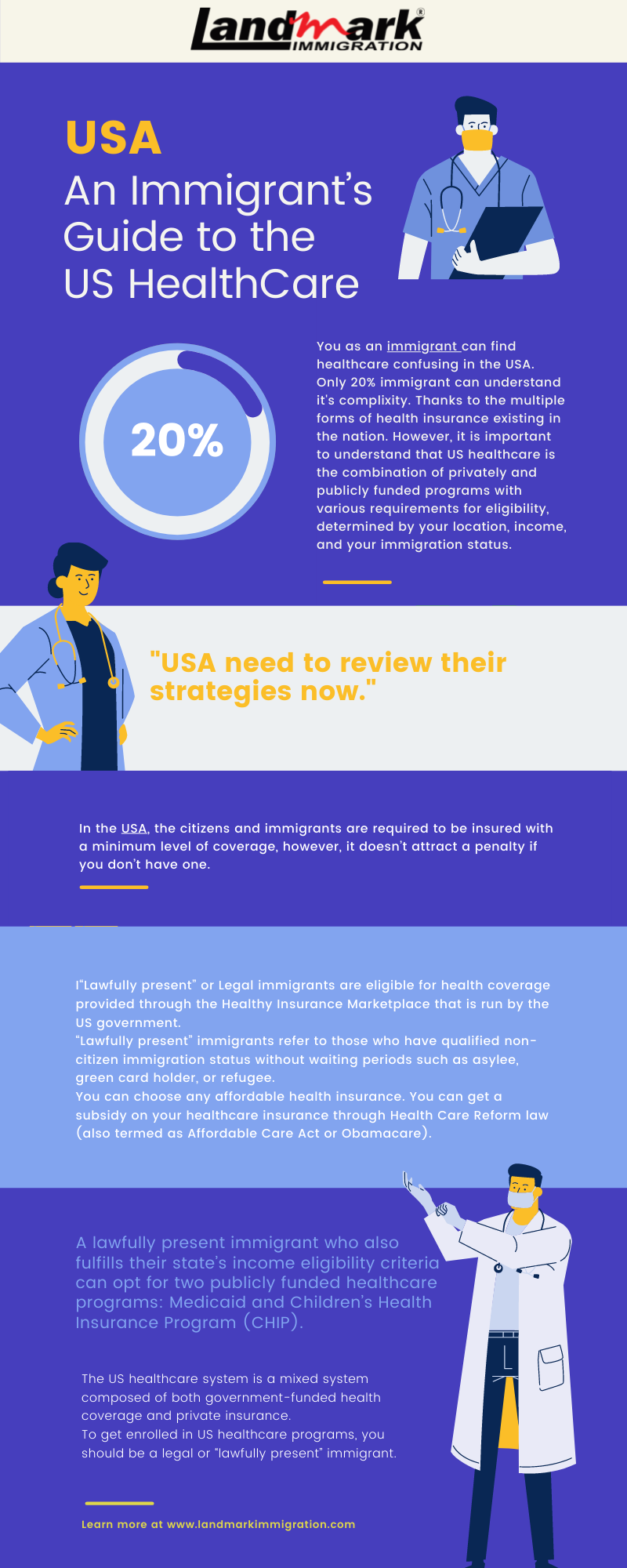An Immigrant's Guide to the US HealthCare
You as an immigrant can find healthcare confusing in the USA. Thanks to the multiple forms of health insurance existing in the nation. However, it is important to understand that US healthcare is the combination of privately and publicly funded programs with various requirements for eligibility, determined by your location, income, and your immigration status.
The good thing is that there are many resources to help you understand insurance options.
Here we will explain key things about U.S. healthcare for immigrants.
Let's get started.
Why Healthcare is Important for Immigrants?
Nobody wants to fall ill or get injured, but such things are unpredictable--and when these things happen, your health insurance can save you a day.
Health insurance works as a contract between you and your insurance provider. When you opt for a plan, the provider agrees to pay off your medical expenses such as doctor visits, medicine, and regular check-ups.
In the USA, the citizens and
immigrants are required to be insured with a minimum level of coverage, however, it doesn't attract a penalty if you don't have one.
But uninsured people are likely to have poor health than insured ones. This might be because uninsured people have poor access to care than those who are insured, and when these uninsured people need treatment, they are often slapped with expensive medical bills.

What are the Healthcare Options for Immigrants in the USA
"Lawfully present" or Legal immigrants are eligible for health coverage provided through the Healthy Insurance Marketplace that is run by the US government.
"Lawfully present" immigrants refer to those who have qualified non-citizen immigration status without waiting periods such as asylee, green card holder, or refugee.
You can choose any affordable health insurance. You can get a subsidy on your healthcare insurance through
Health Care Reform law (also termed as Affordable Care Act or Obamacare).
If you lack
eligible immigration status, you can still be eligible for limited medical emergency services through Medicaid, depending on your location. But undocumented immigrants are not provided with Medicaid or Marketplace coverage.
What are Publicly Funded Insurance Programs an Immigrant Can Choose From
A lawfully present immigrant who also fulfills their state's income eligibility criteria can opt for two publicly funded healthcare programs: Medicaid and Children's Health Insurance Program (CHIP).
Medicaid:
Medicaid is a popular state and federal health insurance for a low-income person. The coverage varies based on the state you live in. It can be called Medi-Cal in California while it is known as Apple Health in Washington.
Medicaid generally covers healthcare services like inpatient and outpatient hospital services, laboratory, x-ray, and physician services. You can also qualify for Medicaid through other factors such as family status and disability if you don't get eligible based on income (which varies by state).
CHIP:
If your income is too high to get qualified for Medicaid, you can try CHIP that provides coverage for children. Like Medicaid, the eligibility and coverage with CHIP vary from state to state. Some of the common healthcare services covered by CHIP are routine check-ups, prescriptions, and emergency services.
You can opt for Medicaid and CHIP at any time. The coverage comes into effect immediately once you qualify for the program. However, some states require you a five-year waiting period to get enrolled in these programs.
Private Insurance Programs:
Private health insurance, as the name suggests, is any form of coverage being offered by a company, rather than a state or government. One of the common forms of private insurance is employer-sponsored programs.
The Conclusion:
The US healthcare system is a mixed system composed of both government-funded health coverage and private insurance.
To get enrolled in US healthcare programs, you should be a legal or "lawfully present" immigrant.
The coverage varies based on the state where you live. Still Confuse -
Talk to our experts and clear all your doubts.


